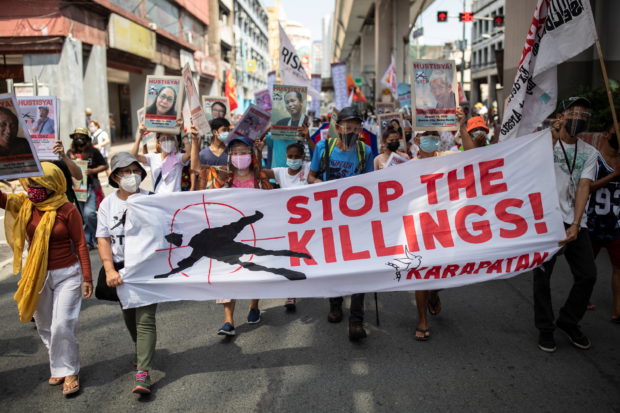‘Significant’ human rights abuses were committed by and for PH gov’t, says US State Dep’t

FILE PHOTO: Protesters calling to stop extra-judicial killings march towards the presidential Malacanang Palace during a protest to commemorate President Rodrigo Duterte’s final year in office, in Manila, Philippines, June 30, 2021. REUTERS/Eloisa Lopez/File Photo
MANILA, Philippines — The United States has received “credible information” showing that significant human rights abuses, including extrajudicial killings, have been made “by and on behalf” of the Philippine government, and that the Philippine National Police was “largely ineffective” in cleansing its ranks.
In its 2021 Country Report on Human Rights Practices, the US Department of State said that it received “credible reports that members of the security forces committed numerous abuses.”
The US said that these significant rights issues included “unlawful or arbitrary killings, including extrajudicial killings, by and on behalf of the government and nonstate actors; reports of forced disappearance by and on behalf of the government and nonstate actors; torture by and on behalf of the government and nonstate actors; harsh and life-threatening prison conditions; (and) arbitrary detention by and on behalf of the government and nonstate actors.”
“The government investigated a limited number of reported human rights abuses, including abuses by its own forces, paramilitary forces, and insurgent and terrorist groups. Concerns about police impunity continued following the increase in killings by police in 2016. Significant concerns also persisted about impunity for other security forces, civilian national and local government officials, and powerful business and commercial figures,” the US stated.
“The national police’s institutional deficiencies and the public perception that corruption in the police was endemic continued,” the US said. “The PNP’s Internal Affairs Service remained largely ineffective.”
The US further cited serious problems with the independence of the judiciary; arbitrary and unlawful interference with privacy; serious abuses in a conflict; serious restrictions on free expression and media, including violence, threats of violence, and unjustified arrests or prosecutions of journalists, censorship, and the use of criminal libel laws to punish journalists; high-level and widespread government corruption; serious government restrictions on or harassment of domestic human rights organizations; and threats and violence against labor activists.
It cited several reports of impunity in the country, specifically in the PNP — one of which was when the Office of the Ombudsman cleared officers from the Manila Police District of its involvement in a 2017 incident in which 12 individuals were found detained in a secret jail hidden behind a wooden bookshelf.
This, despite the Commission on Human Rights (CHR) insistence that the police clearly violated human rights standards, and even the PNP mandate to “serve and protect.”
While US acknowledged the PNP’s efforts in the cleansing program after it reported that its internal cleansing program — which led to 166 persons facing disciplinary sanctions between March and August, 2021; 75 of the 166 were dismissed from service, 48 penalized with one rank demotion, and 43 suspended — it, however, cited another incident in October when the Quezon City Regional Trial Court acquitted 19 police officers charged with killing former Albuera, Leyte Mayor Roland Espinosa inside his cell after President Duterte tagged him as a drug criminal, led by Police Superintendent Marvin Marcos.
Marcos was the former chief of the PNP’s Criminal Investigation and Detection Group Region 8, who was promoted to chief of the 12th PNP Regional Office just 15 months after Espinosa’s killing, and months of senate hearings.
Meanwhile, while the Congressional Committee on Appointments determines whether senior officers selected for promotion have a history of human rights breaches, the US Department of State noted that this merely implies the commission can defer a promotion indefinitely if it uncovers a history of abuse.
“Violations, however, do not preclude promotion,” the report further said.
PNP refutes report
Objecting to the findings of the US state department, the PNP in a statement on Thursday reiterated that it had already dismissed 5,999 “errant” personnels during its internal cleansing program from July 2016 until March 30, 2022 after facing administrative charges due to grave offenses.
.
The PNP said that 714 of these police officers were also involved in drug related cases.
It also showed that 1,129 other officers were demoted, 10,490 were suspended, 848 faced forfeiture of salary, 2,475 were reprimanded, 208 were restricted and privileges were withheld for 286 more personnel.
“These numbers of penalized personnel reflect the PNP’s commitment to cleanse its ranks in order to carry out their mandate in protecting the community,” said the PNP.
Because of this, the PNP said that it opposes the recent report of the US Department of State.
“Although we are not completely disregarding this report, the PNP would like to respond to it with all the significant accomplishments of IAS, as mentioned above,” said PNP.
“It will be unfair for the PNP to be regarded as an organization that tolerates impunity and human rights abuses,” it added.
The US State Department’s annual report is only the latest of several reports that pointed out the flaws in the country’s human rights system, and how impunity remains rampant in the country.
Just recently, on March 29, Amnesty International said that lack of accountability among perpetrators had provided the breeding ground for extrajudicial killings and human rights violations to flourish in the Philippines under the President Rodrigo Duterte administration’s drug war.
RELATED STORY:
Culture of impunity: Two Filipinos killed every day since Jan. 1